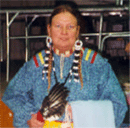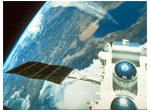|

   
|
 |
 |
  |
|
 |
| The Genesis mission centers on,
but is not limited to, the study of science. Exploring Origins
offers educators an opportunity to incorporate interdisciplinary
studies, including language arts and speech communication,
into their curricula. If you are using Genesis science modules
for the first time, read the User's
Guide thoroughly before you begin. (View User's Guide
as a PDF.)
The Portable Document Format (PDF) is used
to distribute fully formatted, print-quality
documents electronically. The following information
is available to view and print as a PDF file
with Adobe's Acrobat reader. To install the
FREE Adobe Acrobat Reader, visit the Adobe
Web site.
This module contains audio story clips which
accompany the "Exploring
Stories of Origins" Student Text.
The clips may be accessed from this page or
from the student text PDF.
These clips may be heard with RealPlayer audio.
To download the FREE player, visit the RealPlayer
site.
Take a look at science
modules available. All technical terms
in the science modules are compiled in the Glossary for
easy access.
|
|
  |
 |

The goal of Exploring Origins is
to help students understand the cumulative nature of
scientific knowledge and technological advancements and
to understand the theoretical basis for the Genesis mission.
By exploring ideas about the origins of the solar system
held by various cultures throughout the ages, students
will gain an understanding that the Genesis mission is
providing data to answer age-old questions: How did the
solar system come to be as we see it today? How did the
Earth, sun and other planets form? |
|
|
|
|
|
Adobe's Acrobat Reader©

The Portable Document Format (PDF) is used to distribute fully formatted, print-quality documents. |
|
|
|
| |
|
|
|
|
|
|
|
|
|
|
|
|
 |
|
|
|
|
|
 |
Students will examine
the current scientific theory on the origin of the solar system
and will develop questions that could be investigated to further
the scientific understanding. After researching the previous
knowledge base and technology developments that were necessary
for Genesis to become a reality, students will design a new mission
to collect further evidence to contribute to the scientific understanding
of the solar system origins. |
|
 |
Curriculum Connections
Standards Addressed |
| |
|
| |
|
|
|
| |
 |
Better Understanding
In addition to the cumulative nature of scientific knowledge,
students will become acquainted with other aspects of
the nature of science. These aspects include science
as a collaborative effort, the revisionary nature of
scientific theories, the need for evidence to support
scientific ideas, the necessity of testable hypotheses,
and the way that new scientific knowledge is built upon
old ideas after the addition of new data.
The culminating activity involves the students
in the design and proposal of a new Space Agency funded mission
to improve current scientific understanding about the origins
of our solar system. The students’ proposed mission must
build on heritage, both scientific and technological.
|
| |
|
 |
|
|
|
 |
|
|
|
|
|
|
 |
|
|
|
| Writers: |
~Kathy Phillips,
Science Education Consultant
~Greg Rawls, McREL
~Alice Krueger, McREL
~Jacinta Behne, McREL
~Randi Peterson, McREL
~Elaine J. C. DeBassige D'Amato, McREL
|
|
| Technical Editor: |
~Jacinta
Behne, McREL
|
| Special thanks to the following reviewers: |
~Dr. Don Rapp, Jet Propulsion Laboratory
~Dr. John Sutton, McREL
~Deb Jordan, McREL
~Elaine J. C. DeBassige D'Amato, McREL
|
|
|
|
|
|
|
|
|
|
|
|
|
|
|
|
|
|
